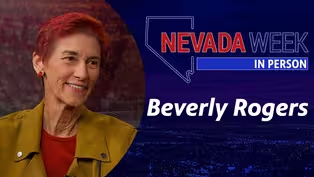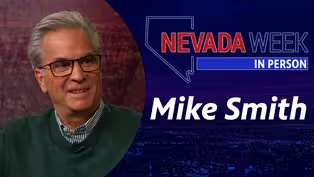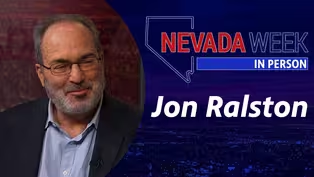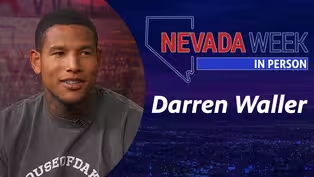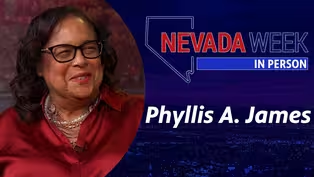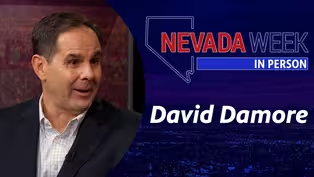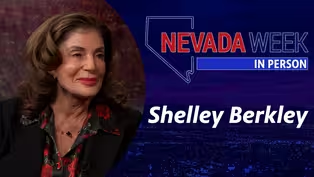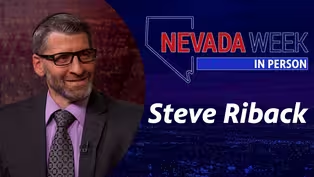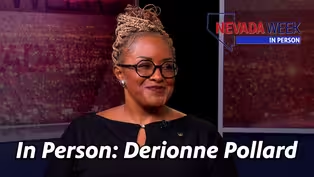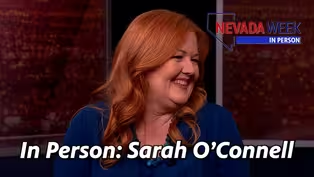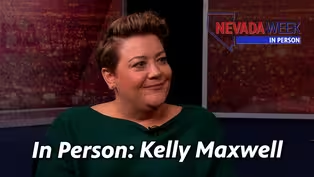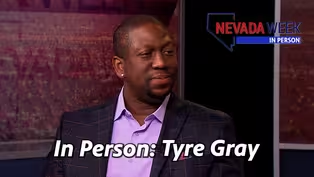
Nevada Week In Person | Liz Ortenburger
Season 1 Episode 46 | 14mVideo has Closed Captions
One-on-one interview with SafeNest CEO Liz Ortenburger.
One-on-one interview with SafeNest CEO Liz Ortenburger.
Problems playing video? | Closed Captioning Feedback
Problems playing video? | Closed Captioning Feedback
Nevada Week In Person is a local public television program presented by Vegas PBS

Nevada Week In Person | Liz Ortenburger
Season 1 Episode 46 | 14mVideo has Closed Captions
One-on-one interview with SafeNest CEO Liz Ortenburger.
Problems playing video? | Closed Captioning Feedback
How to Watch Nevada Week In Person
Nevada Week In Person is available to stream on pbs.org and the free PBS App, available on iPhone, Apple TV, Android TV, Android smartphones, Amazon Fire TV, Amazon Fire Tablet, Roku, Samsung Smart TV, and Vizio.
Providing Support for PBS.org
Learn Moreabout PBS online sponsorshipMore from This Collection
Nevada Week In Person goes beyond the roundtable discussion of Nevada Week with guests for a more casual conversation about their personal passions, new projects and compelling stories that are overlooked in the flurry of the news cycle.
Nevada Week In Person | Beverly Rogers
Video has Closed Captions
One-on-one interview with Rogers Foundation chair Beverly Rogers. (14m)
Nevada Week In Person | Mike Smith
Video has Closed Captions
One-on-one interview with Las Vegas Sun political cartoonist Mike Smith. (14m)
Nevada Week In Person | Jon Ralston
Video has Closed Captions
One-on-one interview with The Nevada Independent CEO Jon Ralston. (14m)
Nevada Week In Person | Darren Waller
Video has Closed Captions
One-on-one interview with Las Vegas Raider tight end Darren Waller. (14m)
Nevada Week In Person | Phyllis A. James
Video has Closed Captions
One-on-one interview Phyllis A. James. (14m)
Nevada Week In Person | David Damore
Video has Closed Captions
One-on-one interview with Chair of the Department of Political Science at UNLV David Damor (14m)
Nevada Week In Person | Shelley Berkley
Video has Closed Captions
One-on-one interview Senior Vice President for Touro University Shelley Berkley. (14m)
Nevada Week In Person | Steve Riback
Video has Closed Captions
One-on-one interview with Las Vegas Metro Police Lieutenant Steve Riback. (14m)
Nevada Week In Person | DeRionne Pollard
Video has Closed Captions
One-on-one interview Nevada State College President DeRionne Pollard. (14m)
Nevada Week In Person | Sarah O’Connell
Video has Closed Captions
One-on-one interview with Director of Eat More Art LLC Sarah O’Connell. (14m)
Nevada Week In Person | Kelly Maxwell
Video has Closed Captions
One-on-one interview with Baby’s Bounty Executive Director Kelly Maxwell. (14m)
Nevada Week In Person | Tyre Gray
Video has Closed Captions
One-on-one interview with Nevada Mining Association President Tyre Gray. (14m 1s)
Providing Support for PBS.org
Learn Moreabout PBS online sponsorshipShe leads Nevada's largest and most comprehensive charity dedicated solely to solving domestic violence issues.
Liz Ortenburger, CEO of SafeNest, joins us this week for Nevada Week In Person.
♪♪♪ Support for Nevada Week In Person is provided by Senator William H. Hernstadt.
-Welcome to Nevada Week In Person.
I'm Amber Renee Dixon.
In 2017 she became the first CEO of SafeNest in 38 years.
This, after a 13-year career in Girl Scouts.
Liz Ortenburger, thank you for joining us for Nevada Week In Person.
-Thank you for having me.
-So 2017, first CEO of SafeNest in 38 years, taking over for the founder, Estelle Murphy.
What was that transition like?
-Well, there was huge shoes to fill, right?
So, and before I even took the job, I was concerned with it.
With a career in Girl Scouts, did I have the skills that would transition into domestic violence?
Could I make an impact?
Would I-- Would I help the agency in the direction it needed to go?
And so fortunately, the answers have been yes.
Stepping into Estelle's shoes was such an honor, and we overlapped for a period of time.
So I got to glean some of that knowledge from her.
And we maintain a friendship, and her soroptimist club does amazing things for the agency still.
-In what ways did Girl Scouts prepare you for this position?
-You know, my passion has been in the nonprofit space.
It's always leaned towards the business side of a nonprofit.
So, you know, on the business side, Girl Scouts and SafeNest are not terribly different, right?
Of course, there's a cookie sale thrown in there that makes things change a little bit.
But from, you know, finances-- how do you look at your forecasting, how do you run a good business-- a lot of the skills were the same.
But what I found that I didn't realize I had was this passion in this space of direct service for people really on the frontline of crisis.
So how do we do that work?
And so Girl Scouts certainly prepared me on the business side.
And then the mission and work of SafeNest has carried me through to it.
I love what I do.
-You got your MBA in Spain?
-I did.
-How did that global perspective impact you?
-Yeah, you know, it was important to me to kind of-- At the time, I was sort of not understanding how, I'd say, incredible the United States is in its position.
So I said, I've got to leave for a while to be able to look back and say, What's great about the US?
And I sat in a classroom with 77 other students from 55 other nations.
So there certainly was a huge global perspective.
And what I loved about that is when you have a conversation with someone from India or China or even Brazil around child labor and what does that look like, it's really fascinating to get perspectives from around the world.
And so it really broadened my mind and in understanding how do we start to look at things with a different lens, which I think has helped me grow certainly as an individual, definitely as a professional.
But ultimately, it also helped me find a love for the United States I didn't realize that I had and how lucky we are in this country with the things that we have available to us.
-The discussions around child labor, were you surprised by some of them?
-You know, I think growing up in the United States-- So my family is British.
We moved here when I was five, so I grew up in the United States.
You walk into most situations thinking, Well, morally, child labor is wrong, right?
And I still agree with that.
But when you start to hear the perspective from a Brazilian classmate who worked his way up from a very economically depressed family to being in one of the best business schools in the world, and his views on how child labor helped him work his way out of the economic depression his family was in.
You start to understand that this is not always a question about what's right and wrong from our lens, but it's a question of how do we make sure that everyone on our planet has access to pathways for a brighter future than they may be sitting in.
And that was really the learning there, right?
It wasn't, This issue is right or wrong.
It was, Who has access, and how do we then, you know, increase that access for everyone, including in our own country?
Because, certainly, I am fully aware that I have had access to things other people would only-- could only dream of or ever even know existed.
And that's a beautiful part of the way that I was able to grow up.
We have to think about how, and specifically in the work to SafeNest, how do my survivors and the kids of my survivors have access to the full plethora of things available to them in this country?
And what does that look like?
-One aspect that you've addressed is the financial independence of some of the domestic violence survivors that you serve.
Will you tell me about Sip for a Survivor.
-Yes.
So several months ago, we were doing as we do, reviewing our services and saying, Where are we not meeting the full potential of what our clients need?
And it was really clear that clients need access to resources in the form of money.
And we do not, nor do we think it's appropriate to just give money.
We're not a lending program; we don't have that mechanism built in.
But what we can create is opportunities for survivors to earn money while they're in residence with us.
So we did a full day session with a great CEO coach in town and said, Okay, let's put all the ideas out on the board.
We narrowed down on coffee, launched this coffee business, and now survivors who are in residence with us work the coffee business.
They do customer service.
They do order fulfillment.
They check the inventory.
They do all the pieces, and that's in partnership with another great nonprofit in town, Unshakable, who really works to help domestic and sexual violence survivors get employed.
So Sip for Survivors is really honoring that at several restaurants through the downtown area and beyond.
But it's this idea that here's a coffee brand that I can get a monthly subscription to or buy one-off that is actually helping elevate survivors out of their circumstances.
Because what the data shows is really clear.
When survivors have access to financial resources, even if they return to their abuser, the abuse stops.
And that is because access to financial decision making and financial agency is incredibly empowering, and it gives you a different seat at the table.
And there's a lot built into that.
There was a great book that came out a couple years ago called Violence Against Women , and it looked at the international scope of that.
And they were looking at, you know, women being able to earn money in India who were in depressed relationships or violent relationships.
It gives a survivor a different voice at the table, and we wanted to bring that here to Nevada to make sure our survivors have access to that as well.
-Even if a survivor returns to his or her abuser, if they have some sort of financial independence, the abuse will stop?
-That is what the data shows.
-That's incredible.
-Right, yeah.
Because access to resources and choices and empowerment, it plays an important role.
You know, a lot of people will ask, Well, why doesn't she just leave?
And it's like, Well, why would she choose to stay?
Let's look at it from there, and-- or, Why is she forced to stay, and what barriers might be in place of her leaving.
And so often that huge barrier is finances.
So it's a very different conversation when I say, I need this abuse to stop.
I'm not going to tolerate it.
And you know that I have a pathway out.
It's not the cure-all, but it's certainly a very intriguing part of how we end this cycle.
-An intriguing part about what work you do is that not only do you serve the victims, but the abusers as well.
-Yes.
-Why and how?
-Right.
So you know, SafeNest's mission, to end the epidemic of domestic and sexual violence, really says it all.
How do you end something if you aren't working with the root cause?
Root cause is the abuser.
A survivor is a symptom of an abuser's inability to process anger, emotions, whatever, we can insert any word there; but an abuser is causing that violent situation.
And so SafeNest, really 20 years ago, started an abuser program for those folks that are mandated through Child Protective Services or the court, and now we have an entire voluntary program so that you can engage in services to understand your behavior.
And once you take responsibility for it, we can actually work on changing that behavior so that the violence can stop.
And the, you know, abuser will have on average, three to seven, sort of, victims in their lifetime.
So if we can, if you can be relayed into our program after the first abuser, great.
We've stopped-- The goal is to stop that abuse for two to six more survivors.
And so the other thing that it does, which is the, sort of, the untold gem in all of that is, it provides my counseling staff and my staff really great information on how abusers are operating, to work with clients.
-How successful has that been?
-You know, there is no longitudinal data in the space.
We look at two variables.
We look at two studies: We look at the Domestic Violence Inventory and their Hope scores.
And so what I can tell you from that is that 93% of the abusers that have been through our program scored as we would hope, showing that they are moving their selves aware of their behavior, they're moving their behavior out of that, that behavior.
We don't have any longitudinal studies, though.
That's the-- That would be the thrilling part, to have the resources to be able to say, Okay, what does that look like at six months?
What does that look like as a year?
And that's really something I think that the State could invest in to understand which programs are successful, what does that look like, and how do we increase that then so that these cycles stop.
-On the resources side, you could use some help in funding for transitional housing.
At a recent Clark County Commission meeting you had said, quote, When the 2024 Super Bowl comes here, and I don't have access to overflow housing because the town is full, women, men, and children who are raped will have no safe place to go, except for homeless shelters.
In the entertainment capital of the world when we can do a $1.5 billion stadium, can we not invest in some of the other pieces as well?
How was that received?
-Well, it was received with its intention, which is, we're not investing in this critical space.
And we have, unfortunately, we sort of have a history as a county of sort of lumping all homelessness together.
But what we don't understand is we have this incredibly important area of domestic and sexual violence that, while they get lumped into that homelessness, needs to be dealt with very differently.
Since then, I'm happy to say we've had a conversation with the CFO at the County, and they are interested in funding a project.
So we put, sort of took our ARPA funding project, which was this massive, like $40 million.
This is what the city needs, which I still absolutely believe this is what the city needs.
But I also have to deal in realism.
No one is writing me a check for $40 million today.
And we've dialed it back to a $15 million project, which will do some of the intended pieces of the original project.
But certainly what we-- You know, we had NASCAR in town two weeks ago, and we'll have Formula 1 here pretty soon.
When NASCAR came to town, hotel rooms were $900 a night, if you could find one.
We had three sexual survivors that weekend that needed housing.
We brought them to our shelter, of course, but they're sleeping on air mattresses.
I can't think of any circumstances in which I would want anybody that I cared about who had just suffered something like a sexual violent attack, gone through a rape exam, then worked with police, and done all of that to find their safe haven is an air mattress on the floor of a multipurpose room.
This is where we need to do better.
We have to understand as a community that the minute something violent happens, we have to have resources for the healing to start as soon as possible.
And that's not on an air mattress in a multipurpose room.
And my staff do incredible work, but the surroundings have got to match what a survivor needs.
-How often is your shelter full?
-Pretty consistently.
So we run in a-- We have a red, yellow, and green rating that my staff fill out every day.
We've been on red really for two years.
We have had some reprieves every once in a while, but we-- and we have also been consistently overflowing into hotels and a partnership we have with Siegel Suites and things like that.
But our September hotel bill was $100,000.
And that money runs out in November.
That was through Cares Act money because they knew shelters would be impacted.
That money runs out in November.
So that is going to mean we have to start to look at our resources and what can we do for highly lethal victims?
-And last question: Why in red for the last two years?
-Really, COVID.
The increases from COVID.
So it was sort of a perfect storm for us.
COVID created an increase, and then some other shelters in town that would normally help support our clients either made operational decisions to curb their capacity or have been running full themselves.
-Liz Ortenburger, thank you so much for sharing your time with Nevada Week In Person.
And thank you for joining us.
To see more of Nevada Week In Person as well as this week's edition of Nevada Week, go to vegaspbs.org/nevadaweek.
♪♪♪

- News and Public Affairs

Top journalists deliver compelling original analysis of the hour's headlines.

- News and Public Affairs

FRONTLINE is investigative journalism that questions, explains and changes our world.












Support for PBS provided by:
Nevada Week In Person is a local public television program presented by Vegas PBS
